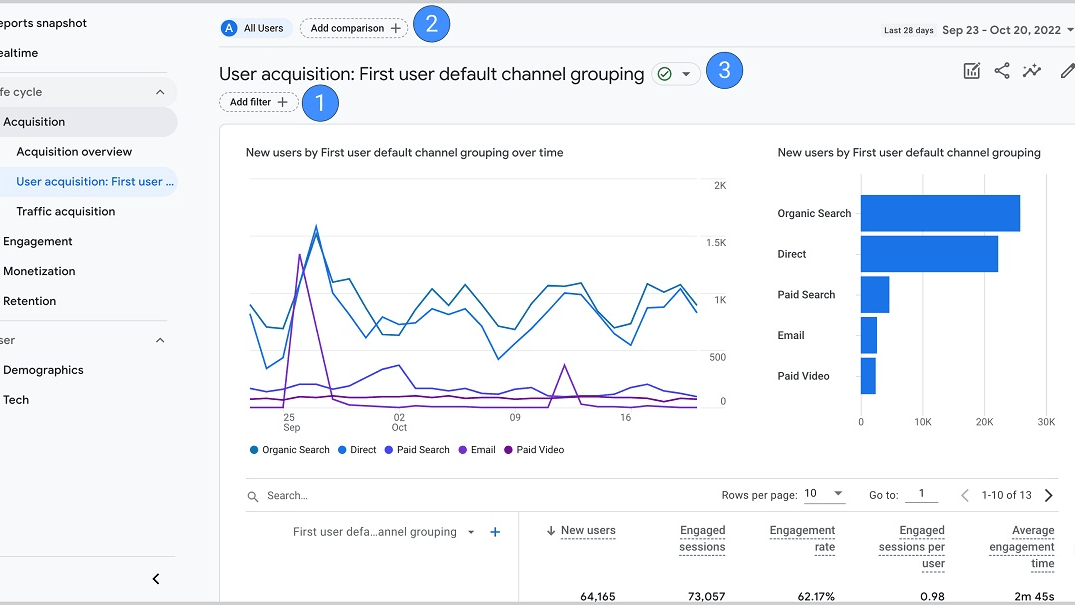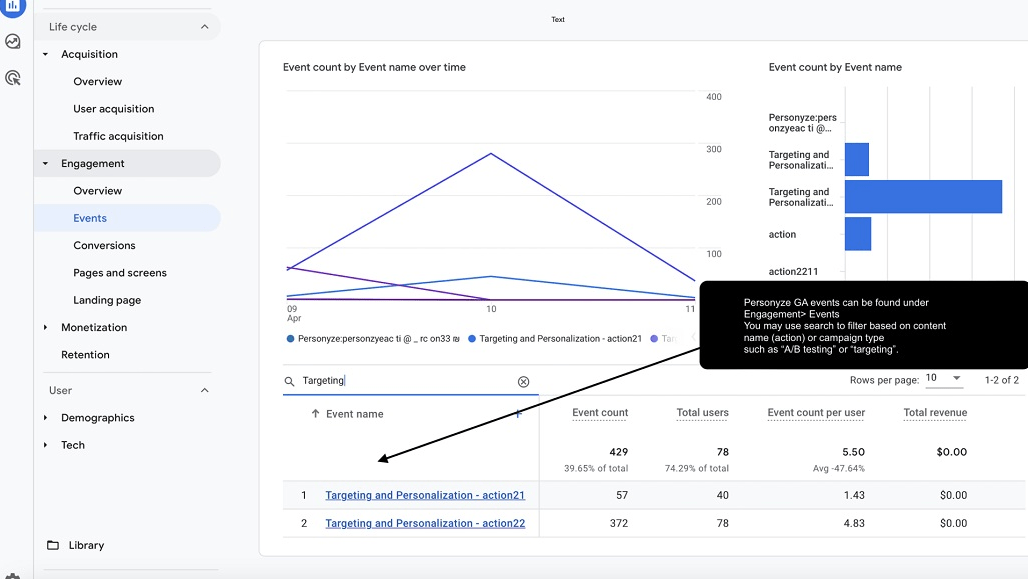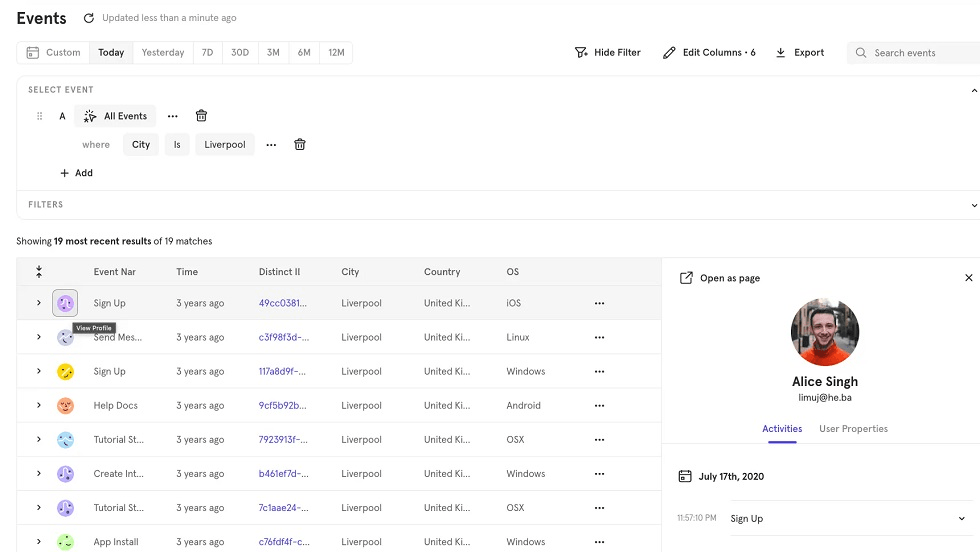Mixpanel vs Google Analytics: Choosing the right analytics tool
- 01Mixpanel vs Google Analytics: overview
- 02What's the difference between Mixpanel and Google Analytics?
- 03Mixpanel pros and cons
- 04Google Analytics pros and cons
- 05Mixpanel compared to Google Analytics
- 06Google Analytics compared to Mixpanel
- 07Features comparison
- 08Mixpanel vs Google Analytics: Which is the best for your business?
- 09Promotions on Data Analytics software
- 10Alternatives to Mixpanel & Google Analytics
Save up to $50,000 on Mixpanel
Save up to $50,000 on Mixpanel
In your journey to optimize website and app analytics, you've likely encountered both Mixpanel and Google Analytics. Mixpanel, founded in 2009, focuses on user behavior analytics, while Google Analytics, a service provided by tech giant Google, has been a staple in analytics since 2005. These platforms have become go-to choices for businesses seeking comprehensive insights into user interactions and website performance. But the question remains: which one aligns best with your specific business needs?
This article delves into a thorough comparison of Mixpanel and Google Analytics, examining their features, distinct capabilities, and the different approaches they take towards data analytics and reporting. We'll explore how Mixpanel's event-centric model compares with Google Analytics' session-based tracking, along with their user interface, data visualization tools, and customization options.
Mixpanel vs Google Analytics: overview
Mixpanel and Google Analytics are two leading tools in the realm of web and mobile app analytics, each offering distinct features and advantages to businesses and developers.
Mixpanel is recognized for its focus on user behavior tracking and analytics. It specializes in providing detailed insights into user actions within an application, making it an excellent choice for businesses that prioritize understanding user interactions and engagement. On the other hand, Google Analytics is renowned for its comprehensive web analytics capabilities. It offers a wide range of features, including traffic analysis, audience segmentation, e-commerce tracking, and more.
Now, let's explore the Mixpanel vs. Google Analytics comparison to assist you in making an informed choice when selecting the right analytics tool for your specific needs.
What's the difference between Mixpanel and Google Analytics?


Mixpanel and Google Analytics are two prominent analytics tools used by businesses to gain insights into user behavior on websites and mobile applications. While both platforms serve the broader purpose of tracking and analyzing user interactions, there are key differences in their focus and capabilities.
Mixpanel is known for its event-based tracking and user-centric approach. It excels in providing in-depth insights into user actions within an application. With Mixpanel, you can track specific events and actions taken by users, such as button clicks, form submissions, and in-app interactions. This event-driven tracking allows you to understand how users engage with your product on a granular level. Mixpanel also offers features like funnel analysis, cohort analysis, and retention tracking, making it ideal for businesses looking to optimize user journeys, improve user engagement, and increase conversion rates.
On the other hand, Google Analytics is a more comprehensive analytics platform that primarily focuses on website and traffic analytics. It provides a wide range of data related to website visitors, including information on traffic sources, user demographics, and user behavior. Google Analytics is highly effective for understanding website performance, SEO, and e-commerce tracking. It also offers robust reporting and visualization tools, making it suitable for businesses that want to monitor overall website performance and make data-driven decisions related to marketing and website optimization.
One significant difference between the two platforms is their tracking methodology. Mixpanel relies on event tracking and user-centric data, which is particularly valuable for product-focused businesses looking to improve their app or website's user experience. Google Analytics, on the other hand, primarily tracks page views and sessions, making it well-suited for businesses focused on understanding website traffic and online marketing efforts.
Additionally, Google Analytics is free to use for most businesses, while Mixpanel offers a free plan with limitations and charges based on usage. The choice between Mixpanel and Google Analytics ultimately depends on your specific goals and the depth of insights you require. If you prioritize understanding user behavior within your application, Mixpanel may be the better choice. However, if you primarily need website traffic and marketing analytics, Google Analytics is a comprehensive and cost-effective solution.
1 year free on Mixpanel
Get 1 year free on Mixpanel and up to $50,000 savings with Secret.
Mixpanel pros and cons
What are the advantages of Mixpanel?
- Event-driven analytics: Mixpanel excels in event tracking, allowing you to monitor and analyze specific user actions or events within your application. This granularity enables you to gain deep insights into user behavior and engagement.
- User-centric approach: Mixpanel focuses on individual user journeys, enabling you to understand how each user interacts with your product over time. This helps you personalize user experiences and improve retention rates.
- Funnel analysis: Mixpanel provides robust funnel analysis tools that allow you to track and optimize user conversion paths. You can identify drop-off points and make data-driven improvements to enhance user flows.
- Cohort analysis: With Mixpanel, you can segment users into cohorts based on specific criteria, such as sign-up date or behavior. This helps you compare the performance of different user groups and tailor your strategies accordingly.
- Real-time analytics: Mixpanel offers real-time data updates, ensuring that you can monitor user activity as it happens. This feature is valuable for businesses that require immediate insights to make timely decisions.
What are the disadvantages of Mixpanel?
- Learning curve: Mixpanel's event-based tracking and complex analytics features may have a steeper learning curve for beginners. It may take some time to set up and fully understand how to leverage its capabilities effectively.
- Costly for high volume: Mixpanel's pricing can become expensive for businesses with high event volumes or a large user base. As usage increases, so does the cost, which may not be feasible for startups or small businesses.
- Limited free plan: Mixpanel offers a free plan with limitations, including limited data retention and the number of tracked events. For businesses that require extensive data storage and analysis, this plan may be insufficient.
- Privacy and compliance: Depending on your region and the type of data you collect, Mixpanel's data handling practices may raise privacy and compliance concerns. It's essential to ensure that you align with relevant regulations.
- Integration complexity: While Mixpanel offers various integrations, setting them up and ensuring data consistency across multiple platforms can be challenging. You may require development resources to implement and maintain integrations effectively
Compare Mixpanel to other tools
Google Analytics pros and cons
What are the advantages of Google Analytics?
- Comprehensive data: Google Analytics provides a wealth of data on website traffic, user behavior, demographics, and more. It offers a broad overview of how users interact with your website or app, making it suitable for various analytics needs.
- Free version available: Google Analytics offers a free version that caters to the needs of many businesses. It's accessible and cost-effective, making it an attractive option for startups and small businesses with limited budgets.
- Integration with other Google services: Google Analytics seamlessly integrates with other Google services like Google Ads and Google Search Console, allowing you to combine data from different sources for a more holistic view of your online presence.
- Customization and segmentation: You can create custom reports, set up goals, and segment your audience in Google Analytics. This flexibility enables you to tailor your analytics to specific business objectives and gain deeper insights into your user base.
- Real-time reporting: Google Analytics provides real-time data, allowing you to monitor website activity as it happens. This is valuable for tracking live campaigns, events, or promotions and making immediate adjustments.
What are the disadvantages of Google Analytics?
- Learning curve: Google Analytics can be overwhelming for beginners due to its extensive features and settings. Users may need time to understand and make the most of its capabilities.
- Data sampling: In the free version of Google Analytics, large datasets may be subject to data sampling, which can result in less accurate insights. To access unsampled data, you may need to upgrade to a paid version.
- Privacy and compliance: Google Analytics collects user data, which raises concerns about privacy and compliance with data protection regulations like GDPR. Businesses must ensure they configure Google Analytics to align with relevant regulations.
- Limited support: While there are online resources and communities for Google Analytics, the platform itself doesn't offer direct customer support for free users. Access to premium support is available with paid plans.
- Dependency on Google: Using Google Analytics means relying on a third-party service, and some businesses may be uncomfortable with the potential loss of control over their data or changes in Google's policies.
Compare Google Analytics to other tools
Mixpanel compared to Google Analytics
Mixpanel and Google Analytics are both popular analytics tools, but they have distinct focuses. Mixpanel excels in tracking user behavior within web and mobile applications, offering event-based analytics and cohort analysis. It's ideal for businesses seeking in-depth insights into user interactions and engagement.
On the other hand, Google Analytics is known for website traffic analysis, user demographics, and marketing performance. It provides a comprehensive overview of website activity. Choosing between them depends on your specific needs; Mixpanel for user-centric insights within your application, and Google Analytics for a broader view of website performance and online marketing efforts.
Is Mixpanel better than Google Analytics?
When considering whether Mixpanel is better than Google Analytics, it's essential to delve into the nuanced differences beyond their primary focuses. Mixpanel's strength lies in its ability to offer detailed, real-time analysis of user actions, making it a powerful tool for product managers and UX designers who aim to understand and improve the user journey within their apps. Its custom event tracking and advanced segmentation features enable deep dives into specific user interactions, a level of detail that Google Analytics does not match.
However, Google Analytics shines in its integration with Google's advertising ecosystem and its ability to track cross-platform user behavior, which is invaluable for digital marketers. The decision hinges on whether the priority is intricate, application-specific user behavior analysis (Mixpanel) or a holistic view of website and marketing performance (Google Analytics).
What is Mixpanel best used for?
Mixpanel is best used for tracking and analyzing user behavior within web and mobile applications. It excels in providing detailed insights into how users interact with a digital product.
Mixpanel's event-based tracking allows businesses to monitor specific actions and events taken by users, facilitating the optimization of user journeys, enhancing engagement, and increasing conversion rates. It is particularly valuable for businesses looking to personalize user experiences, improve retention rates, and make data-driven decisions to enhance their digital products. Mixpanel is an essential tool for those focused on user-centric analytics and understanding the intricacies of user engagement within their applications.
Can Mixpanel replace Google Analytics?
While Mixpanel and Google Analytics are both powerful analytics tools, they serve different primary purposes. Mixpanel excels in tracking user behavior within web and mobile applications, offering event-based analytics and user-centric insights. Google Analytics, on the other hand, is designed for broader website traffic analysis, marketing performance, and user demographics.
While Mixpanel can provide detailed insights within your application, it may not replace Google Analytics for comprehensive website analytics. The choice depends on your specific needs; they can complement each other but are not direct replacements. Businesses often use both tools simultaneously to gain a complete understanding of their online presence.
Is Mixpanel cheaper than Google Analytics?
The cost comparison between Mixpanel and Google Analytics depends on your usage and needs. Google Analytics offers a free version that can be cost-effective for many businesses, making it seem cheaper upfront. Mixpanel’s pricing structure, however, offers a free plan with limitations and charges based on usage, which can become more expensive for businesses with high event volumes or specific analytical requirements.
So, while Google Analytics may appear more cost-effective initially, the actual cost-effectiveness depends on the scale and complexity of your analytics needs. Careful consideration of your usage and budget is necessary to determine which option is more economical for your business.
Is there a better Data Analytics software than Mixpanel?
Whether there's a "better" software than Mixpanel depends on your specific analytics needs and objectives. Mixpanel is renowned for its user behavior tracking and event-based analytics, making it a valuable tool for businesses focused on understanding individual user interactions within web and mobile applications.
However, alternatives to Mixpanel like Google Analytics, Adobe Analytics, and Amplitude offer different strengths. Google Analytics provides comprehensive website and traffic analytics. Adobe Analytics offers robust marketing and e-commerce tracking. Amplitude specializes in product analytics. The choice of the "better" software depends on your particular analytics goals, the type of data you want to collect, and the level of granularity you require to make informed decisions about user engagement and product optimization.
1 year free on Mixpanel
Get 1 year free on Mixpanel and up to $50,000 savings with Secret.
Google Analytics compared to Mixpanel
Google Analytics and Mixpanel are both powerful analytics tools but serve different primary purposes. Google Analytics is renowned for website traffic analysis, user demographics, and marketing performance. It provides a comprehensive overview of website activity, making it ideal for understanding online presence and marketing effectiveness.
In contrast, Mixpanel excels in tracking user behavior within web and mobile applications, offering event-based analytics and user-centric insights. It's designed to provide a deep understanding of how users interact with digital products, making it valuable for optimizing user journeys, enhancing engagement, and increasing conversion rates. The choice between them depends on your specific analytics needs and goals.
Is Google Analytics better than Mixpanel?
Determining if Google Analytics is superior to Mixpanel hinges on the distinct analytical needs of a business. While Mixpanel offers detailed insights into user interactions within apps, Google Analytics stands out for its robust capabilities in wider web analytics and marketing. Its strength lies in the integration with other Google services, making it indispensable for businesses leveraging Google's advertising and search platforms.
Moreover, Google Analytics excels in tracking and understanding cross-platform user journeys, offering a holistic view of a user's interaction with a brand's digital presence. This broad-spectrum analysis is crucial for businesses focused on maximizing their online presence and refining their digital marketing strategies, areas where Mixpanel's more focused, app-centric analytics may not provide comprehensive insights. The superiority of Google Analytics is therefore contextual, aligning with objectives centered around broad digital marketing and web analytics, compared to Mixpanel's specialized, in-depth app user analysis.
What is Google Analytics best used for?
Google Analytics is best used for comprehensive website and mobile app analytics. It excels in tracking website traffic, user behavior, and marketing performance. With Google Analytics, businesses can gain valuable insights into the sources of website traffic, user demographics, and how visitors navigate their websites. It offers tools for measuring e-commerce performance, conversion tracking, and analyzing the effectiveness of online marketing campaigns.
Google Analytics provides a broad overview of website activity, making it essential for optimizing website design, content, and marketing strategies. It is an indispensable tool for businesses looking to enhance their online presence and make data-driven decisions to achieve their online objectives.
Can Google Analytics replace Mixpanel?
While both Google Analytics and Mixpanel are powerful analytics tools, they serve distinct purposes, and whether one can replace the other depends on your specific needs. Google Analytics is primarily designed for website and traffic analytics, providing insights into website visitors, demographics, and marketing performance. Mixpanel, on the other hand, excels in user behavior tracking and event-based analytics within web and mobile applications.
While Google Analytics can provide valuable data about website traffic, it may not fully replace Mixpanel's capabilities for understanding user interactions and engagement within applications. In many cases, businesses use both tools simultaneously to gain a comprehensive view of their online presence and user behavior.
Is Google Analytics cheaper than Mixpanel?
The cost comparison between Google Analytics and Mixpanel depends on your specific needs and usage. Google Analytics’s pricing structure offers a free version that can be cost-effective for many businesses, making it appear cheaper initially.
Mixpanel, however, offers a free plan with limitations and charges based on usage, which can become more expensive for businesses with high event volumes or specific analytical requirements. The actual cost-effectiveness of either tool depends on the scale and complexity of your analytics needs. Careful consideration of your usage patterns and budget is essential to determine which option is more economical for your business.
Is there a better Data Analytics software than Google Analytics?
Determining the superior analytics software to Google Analytics relies on your specific needs. Several alternatives cater to various aspects of web and app analytics.
Options like Mixpanel, Semrush, Kissmetrics, and Smartlook offer distinct features. Mixpanel specializes in user behavior tracking and event-based analytics, Semrush excels in SEO and online visibility analysis, Kissmetrics focuses on customer engagement and retention, and Smartlook provides detailed user session recording.
Your choice depends on your analytics objectives, the data you require, and the depth of insights needed for user engagement and product enhancement. A comprehensive assessment of these factors will lead you to the most suitable analytics tool for your specific requirements.
Features comparison
Google Analytics Dominates in Website Traffic Insights Over Mixpanel

When it comes to tracking and comprehending website traffic, Google Analytics stands as a formidable leader. It offers businesses an extensive understanding of their online audience, encompassing a wealth of demographic information, detailed user behavior analysis, and precise traffic source identification. This comprehensive data set empowers organizations to make informed decisions for website optimization and growth strategies.
In comparison, Mixpanel's event tracking, while valuable, doesn't match the breadth and depth of insights provided by Google Analytics. While Mixpanel excels in tracking specific user actions within web and mobile applications, Google Analytics paints a broader and more detailed picture of website traffic, delivering indispensable knowledge to propel business growth.
Mixpanel's User-Friendly Interface Surpasses Google Analytics

Mixpanel and Google Analytics both offer robust data analytics capabilities, but the distinction in user-friendliness sets them apart. Mixpanel stands out with its intuitive interface, catering to non-technical users. Its short learning curve is exemplified through real-time data updates, straightforward data visualizations, and an easily navigable dashboard. Users can grasp their data without needing to be data experts.
In contrast, Google Analytics, while powerful, can be intimidating for beginners due to complex features and dense data displays. For instance, Mixpanel simplifies event tracking, making it accessible even to those without extensive analytics experience, whereas Google Analytics may require additional training to leverage its full potential.
Mixpanel's User Profiles Outshine Google Analytics for Individual Insights

Mixpanel's user profiles feature stands out as a powerful tool for businesses aiming to gain deep insights into individual user behavior. It enables the creation of detailed and personalized profiles for each user, tracking their actions and interactions over time. This level of granularity is invaluable for enhancing personalization and delivering tailored user experiences.
While Google Analytics does offer customer segmentation capabilities, it doesn't match Mixpanel's level of detailed and individualized user profiling. Google Analytics tends to provide aggregate data and group-level insights, making it less suitable for understanding and catering to the specific behaviors and preferences of individual users.
Google Analytics Leads in Integration Capabilities Over Mixpanel

When it comes to integration capabilities, Google Analytics holds a slight advantage over Mixpanel. Its affiliation with Google grants it seamless integration with an array of Google products, including AdWords, Data Studio, and Google Tag Manager. This comprehensive compatibility makes it a preferred choice for companies already utilizing these tools, as it offers a cohesive and interconnected data ecosystem.
Nevertheless, Mixpanel is by no means lacking in this regard. It boasts numerous integrations with major platforms such as WordPress, Shopify, and Segment, along with a robust API. These features enable businesses to conveniently integrate Mixpanel into their existing tech stack, ensuring that it can effectively communicate with other essential tools.
Google Analytics' Real-Time Dashboards Trump Mixpanel for Immediate Insights

Google Analytics takes the lead with its customizable dashboards, which provide real-time visualization of crucial metrics. This functionality empowers businesses to swiftly access and interpret data, facilitating quick and informed decision-making based on up-to-the-minute information.
Mixpanel, while proficient in offering retention analysis to showcase user return rates, doesn't match Google Analytics' level of real-time data visibility. For businesses reliant on immediate insights for time-sensitive decisions, Google Analytics proves to be the superior tool. It enables the rapid monitoring of website or app performance, ensuring that businesses can respond promptly to changes and trends, ultimately driving more agile and data-driven strategies.
Google Analytics and Mixpanel Offer Equally Effective Funnel Analytics

Mixpanel and Google Analytics both offer robust funnel analytics to assist businesses in optimizing their conversion processes. Mixpanel employs funnel analysis to dissect and visualize how users progress through a series of events or steps within an application. This approach is invaluable for identifying bottlenecks and drop-off points, enabling businesses to refine user journeys and enhance conversion rates effectively.
On the other hand, Google Analytics is dedicated to maximizing conversion potential by identifying critical steps within sales or signup funnels. It provides businesses with comprehensive insights into user behavior, helping them pinpoint areas for improvement and streamline the conversion path.
Mixpanel's A/B Testing Outshines Google Analytics for User Experience Optimization

Mixpanel and Google Analytics both contribute to user experience optimization, but Mixpanel takes the lead with its dedicated A/B testing feature. This tool empowers businesses to conduct controlled experiments on their websites or apps, seeking to enhance user interactions. Mixpanel meticulously compares different variations, generating in-depth analyses to determine which version yields the most favorable outcomes.
In contrast, Google Analytics offers conversion optimization features but lacks the specialized A/B testing tools that Mixpanel provides. While Google Analytics is undoubtedly a powerful tool for overall website and app analysis, Mixpanel's focused approach to A/B testing makes it the preferred choice for businesses seeking precise and efficient website and app modification testing.
Subscribe to our newsletters.
No FOMO here. Stay up-to-date on all the latest deals and news with our monthly newsletter straight to your inbox like 123,000+ entrepreneurs (+ Get 10% off on on our Premium Membership!)
Mixpanel vs Google Analytics: Which is the best for your business?
Mixpanel is the best tool for you if:
- Your primary focus is on understanding detailed user behavior within your application, providing granular data on how users interact with specific features.
- You need real-time analytics to immediately gauge the impact of changes or new features in your app, allowing for swift, data-driven decisions.
- In-depth cohort analysis and segmentation are vital to your strategy, enabling personalized marketing efforts and targeted user experience improvements.
- Custom event tracking tailored to your specific business model or application is a requirement, offering flexibility in measuring unique user actions.
- You prioritize user retention and engagement, seeking insights into how individual user actions contribute to broader trends and business goals.
Google Analytics is the best tool for you if:
- You're looking for comprehensive website traffic analysis, including user demographics, behaviors, and acquisition sources, to optimize your overall online presence and strategy.
- Integration with Google's advertising and marketing tools is crucial for your digital campaigns, allowing seamless tracking and analysis of marketing effectiveness.
- A holistic view of user interactions across your website and digital platforms is needed, offering insights into the user journey from first click to conversion.
- Understanding how different channels contribute to your web traffic and conversions is key, enabling effective multi-channel marketing strategies and budget allocation.
- You require a user-friendly interface with customizable dashboards and reports, making it accessible for team members with varying levels of data analysis expertise.
1 year free on Mixpanel
Get 1 year free on Mixpanel and up to $50,000 savings with Secret.
Alternatives to Mixpanel & Google Analytics
Promotions on Data Analytics software
Start saving on the best SaaS with Secret.
Secret has already helped tens of thousands of startups save millions on the best SaaS like Mixpanel, Google Analytics & many more. Join Secret now to buy software the smart way.













